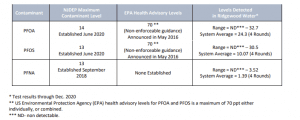PFAS Q&A
Ridgewood's Commitment to Water Quality
Ridgewood Water’s commitment to providing our community with high-quality water is unwavering.
Whenever there is a need for treatment, we invest what is necessary to ensure that we deliver high quality
drinking water to our customers.
Per- and polyfluoroalkyl substances (“PFAS”) are a group of man-made chemicals that includes PFOA, PFOS, GenX, and many others. PFAS have been manufactured and used in a variety of industries in the United States, and around the globe, since the 1940s. PFOA and PFOS have been the most extensively produced and studied of these chemicals. Both chemicals are very persistent in the environment and in the human body—meaning they don’t break down and they can accumulate over time. There is evidence that exposure to PFAS can lead to adverse human health effects. The two prominent PFAS compounds found in the Ridgewood Water groundwater sources are PFOA and PFOS.
Significant improvements in analytical testing allow for drinking water systems to identify and test for compounds at much lower levels than previously possible. As technology has advanced, contaminants we used to measure in the parts per million can now be measured, through enhanced testing capabilities, in parts per billion, or in some cases as low as parts per trillion. As regulation of PFAS compounds has increased alongside enhanced testing capabilities Ridgewood is now required to and is able to test for these compounds at the lowest levels possible. For that reason, Ridgewood Water tests for currently unregulated emerging contaminants to proactively and continuously improve water quality.
PFAS have been manufactured and used in a variety of industrial processes and consumer products since the 1940s. They have also been used historically in certain firefighting foams, principally at airfields, military facilities, and fire training facilities. While Ridgewood Water is working to identify specific sources of its PFAS contamination, we continue to strongly encourage NJDEP to take action to investigate possible PFAS contamination sources so that our customers and rate-payers do not have to bear the enormous cost burden alone for treating contamination caused by the actions and operations -- past or present -- of others.
All levels are in Parts Per Trillion (ppt).

To view the most current drinking water quality data collected by Ridgewood Water click here and then use the Chemical Results tab:
NJDEP-Drinking WaterWatch (state.nj.us)
The New Jersey Department of Environmental Protection (NJDEP) standards in place aim to protect individuals regardless of age, and are based on possible impacts on the single most vulnerable members of the population, including immune-compromised individuals, infants, pregnant people, or elderly individuals. The levels were also developed to be protective over an individual’s lifetime of exposure to drinking water at these levels. Actions being taken within the state, by Ridgewood Water and other water purveyors, are expected to continue to reduce levels of exposure. Exposure to PFAS is primarily through ingestion. Exposure to PFAS through other household uses like showering, bathing, laundry and dishwashing is not significant.
For any questions about health concerns potentially associated with PFAS levels measured in the water, please consult your healthcare provider
Ridgewood Water has been working closely with New Jersey’s Department of Environmental Protection (NJDEP) on this issue since 2019. In May 2023, Ridgewood Water voluntarily entered into an Administrative Consent Order (ACO), recognizing the need for comprehensive treatment, setting a goal to have all treatment facilities online by the end of 2026. Our PFAS Treatment Master Plan for designing, purchasing, integrating, and testing a permanent PFAS treatment system was completed in 2020, and approved by the Village of Ridgewood Council in February 2021. As part of the Master Plan, Ridgewood Water is centralizing PFAS treatment by consolidating from thirty-one (31) treatment facilities to twelve (12) treatment facilities to provide the most efficient treatment.
Implementation of that Master Plan and PFAS treatment upgrades is well underway.
- In 2019, installed granular activated carbon (GAC) at the Carr PFAS Treatment Facility, a proven technology that reduces PFOA and PFOS to non-detect levels.
- In 2020, began engineering, planning and design for PFAS Treatment of the other 11 Treatment Facilities.
- In 2022, Twinney PFAS Treatment Facility went online and is currently active.
- In 2023, construction began at the Prospect and Ravine PFAS Treatment Facilities.
- In 2024, construction began at Wortendyke, Ames, West End, and East Ridgewood.
- In 2025, construction will begin on the last four treatment facilities.
Additionally, Ridgewood Water purchases water from Veolia, Passaic Valley Water Commission, and Hawthorne Water Department and has instituted quarterly monitoring to identify PFAS Levels and minimize exposure by prioritizing delivery of water from wells that have the lowest concentrations (Our PFAS Operational Strategy).
For updates on Ridgewood Water’s PFAS Construction Status, please visit the PFAS Treatment Construction Updates Page on the Ridgewood Water Website.
Granular activated carbon filtration, reverse osmosis, or a combination of the two have been found to reduce the levels of PFOA and PFOS. NSF International has certified certain home use drinking water treatment units that reduce PFOA and PFOS. For a list of NSF International-certified products, please
consult the links below:
https://info.nsf.org/Certified/DWTU/Listings.asp?ProductFunction=P473%7CP
https://www.nsf.org/consumer-resources
NSF International was formerly known as the National Sanitation Foundation. It is a not-for-profit organization that provides public health and safety risk management solutions. Among those solutions, NSF International provides standards development and product certification.
Ridgewood Water encourages its customers to visit the following resources for additional information.
New Jersey Department of Health
http://www.state.nj.us/health/ceohs/documents/pfas_drinking%20water.pdf
New Jersey Department of Environmental Protection
https://www.nj.gov/dep/srp/emerging-contaminants/
Agency for Toxic Substances & Disease Registry
https://www.atsdr.cdc.gov/pfas/index.html
American Water Works Association
PFAS | American Water Works Association (awwa.org)
If you have additional questions or concerns, please feel free to email: waterquality@ridgewoodnj.net or
cswater@ridgewoodnj.net
The following laboratories are identified by NJDEP as PFOA & PFOS – certified for drinking water testing:
PFAS_Drinking_Water_Certified_Laboratories
